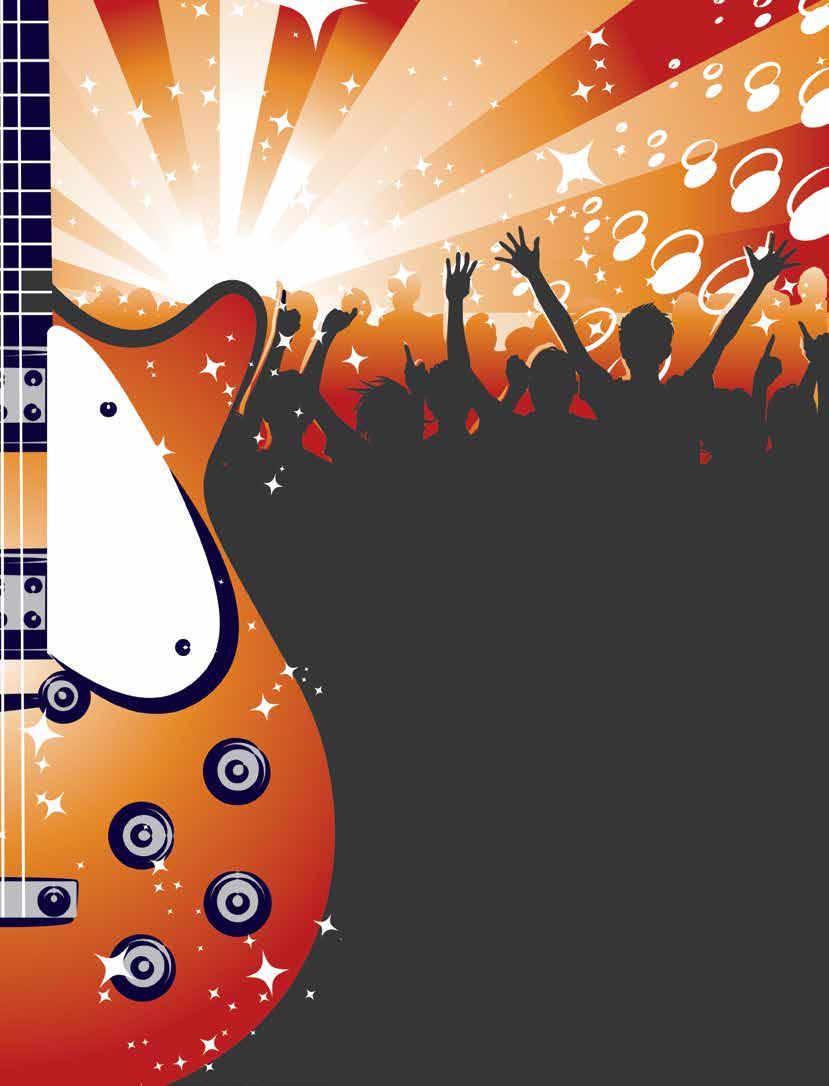
3 minute read
Music Festival Celebrating the Joy of Music The Origins of Music Festivals
he concept of music festivals can be traced back to ancient times when communities gathered to celebrate significant events and milestones. These early gatherings often included music and dance, serving as a form of entertainment and communal bonding. Over time, music festivals evolved to include a wider range of genres, attracting larger audiences and gaining popularity worldwide. In recent decades, music festivals have experienced a remarkable evolution. They have transformed from intimate gatherings into massive, multi-day events featuring renowned artists and attracting attendees from different parts of the globe. Technological advancements have played a significant role in this evolution, allowing for impressive stage productions, high-quality sound systems, and enhanced visual experiences.
Music festivals showcase a diverse range of genres, catering to various musical tastes and preferences. From rock and pop to electronic and hiphop, there is a festival for every music enthusiast. Some festivals focus on specific genres, providing a platform for niche artists and dedicated fans. Others embrace a more eclectic approach, offering a fusion of genres and cross-genre collaborations. Music festivals offer artists a unique
Advertisement
Topportunity to reach a vast audience and gain exposure. Emerging artists can use festivals as a stepping stone in their careers, showcasing their talents to music industry professionals and passionate fans. Established artists also benefit from the festival circuit, connecting with their audience on a grand scale and expanding their fan base.
For music fans, attending festivals is a chance to immerse themselves in a captivating musical experience. Festivals create a sense of community and camaraderie among attendees who share a love for music. These events provide a platform for discovering new artists, connecting with like-minded individuals, and escaping the routines of everyday life.
Music festivals are renowned for creating unforgettable moments and experiences. From breathtaking performances and captivating light shows to the energy of the crowd, every festival holds the potential for magic. It’s the combination of music, atmosphere, and shared excitement that makes these events truly special. Music festivals have their own distinct fashion and culture. Attendees often embrace expressive and eclectic styles, incorporating vibrant colours, unique accessories, and bohemian influences. Festival fashion has become a significant trend, with fashion brands launching collections inspired by the festival aesthetic.
As the global consciousness around sustainability and social responsibility grows, music festivals have recognized the need to embrace these values.
Many festivals have implemented initiatives to reduce their environmental impact and promote positive social change.
One major focus of sustainability at music festivals is waste management. Festivals are working towards reducing the amount of waste generated by implementing recycling programs, encouraging the use of reusable containers, and providing designated areas for composting. Additionally, some festivals have adopted renewable energy sources to power their stages and facilities, reducing their carbon footprint.
Another aspect of sustainability is promoting eco-conscious transportation options. Festivals are encouraging attendees to carpool, use public transportation, or even bike to the event to minimize the environmental impact of travel. Some festivals have also started offsetting their carbon emissions by investing in renewable energy projects or supporting reforestation initiatives. Social responsibility is also an important consideration for music festivals. Many festivals have embraced diversity and inclusion by promoting a lineup that represents a wide range of cultures, backgrounds, and musical styles. They strive to create a safe and welcoming environment for all attendees, free from discrimination or harassment.
Festivals are also increasingly partnering with nonprofit organizations to support social causes. They use their platforms to raise awareness about issues such as mental health, human rights, and equality. Some festivals even donate a portion of their proceeds to charitable organizations, making a positive impact beyond the realm of music.

As music festivals continue to evolve, the future holds exciting possibilities. Technological advancements will play a significant role in enhancing the festival experience. Virtual reality and augmented reality may allow fans to attend festivals from the comfort of their homes or explore immersive virtual stages.
Artificial intelligence and data analytics could be used to personalize the festival experience, tailoring lineups and activities to individual preferences. This would create a more customized and engaging experience for attendees.
The integration of interactive technologies, such as wearables and smart devices, may further enhance the festival atmosphere. Attendees could participate in interactive light shows, share real-time experiences on social media, or engage in virtual communities to connect with other festivalgoers.
In terms of sustainability, the future of music festivals will likely focus on advancing green initiatives. Innovations in renewable energy, waste reduction, and sustainable materials will be key areas of development. Festivals will continue to explore ways to minimize their environmental impact and set an example for responsible event management. The future of music festivals also lies in exploring new destinations and expanding their global reach. Emerging markets and previously untapped locations may become the stage for unique and diverse festival experiences. This expansion will enable more people to access and enjoy the magic of music festivals around the world.
Music festivals have evolved into much more than just live performances. They have become immersive experiences that celebrate music, foster a sense of community, and create lasting memories. From their ancient origins to the vibrant present, music festivals continue to captivate audiences with their diversity, energy, and power to unite.
As festivals embrace sustainability and social responsibility, they pave the way for a more conscious and inclusive future. By reducing their environmental impact, promoting diversity, and supporting social causes, festivals are demonstrating their commitment to making a positive difference beyond the realm of music.










